 |
|---|
| This article is part of a series on the politics and government of Lombardy |
|
The Lombard regional election of 1990 took place on 6 May 1990. The 5th term of the Regional Council was chosen.
 |
|---|
| This article is part of a series on the politics and government of Lombardy |
|
The Lombard regional election of 1990 took place on 6 May 1990. The 5th term of the Regional Council was chosen.
Election was held under proportional representation with provincial constituencies where the largest remainder method with a Droop quota was used. To ensure more proportionality, remained votes and seats were transferred at regional level and calculated at-large.
Proportional representation (PR) characterizes electoral systems in which divisions in an electorate are reflected proportionately in the elected body. If n% of the electorate support a particular political party, then roughly n% of seats will be won by that party. The essence of such systems is that all votes contribute to the result - not just a plurality, or a bare majority. The most prevalent forms of proportional representation all require the use of multiple-member voting districts, as it is not possible to fill a single seat in a proportional manner. In fact, the implementations of PR that achieve the highest levels of proportionality tend to include districts with large numbers of seats.
The largest remainder method is one way of allocating seats proportionally for representative assemblies with party list voting systems. It contrasts with various divisor methods.
The Droop quota is the quota most commonly used in elections held under the single transferable vote (STV) system. It is also sometimes used in elections held under the largest remainder method of party-list proportional representation. In an STV election the quota is the minimum number of votes a candidate must receive in order to be elected. Any votes a candidate receives above the quota are transferred to another candidate. The Droop quota was devised in 1868 by the English lawyer and mathematician Henry Richmond Droop (1831–1884) as a replacement for the earlier Hare quota.
The Christian Democracy party, which had been the leading political force in the region for twenty years, and the Communist Party lost half million votes each while Lega Lombarda, a new autonomist party led by Umberto Bossi, obtained a sounding victory, entering the Regional Council with 15 councillors, along with one for the Lombard Alliance, and becoming the second largest party in the region. Since that point Lega Lombarda became a stable political force in Lombardy.
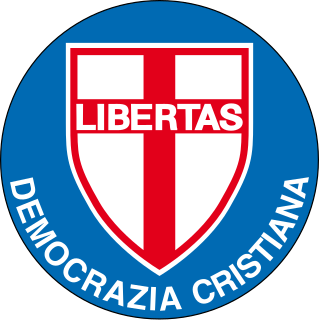
Christian Democracy was a Christian democratic political party in Italy.

The Italian Communist Party was a communist political party in Italy.
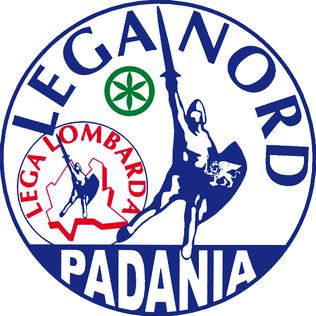
Lega Lombarda, whose complete name is Lega Lombarda–Lega Nord, is a regionalist political party active in Lombardy. It is one of the national sections of Lega Nord (LN) and, along with Liga Veneta, forms the bulk of the federal party, which has been led by Lombards since its foundation.
After the election a cabinet led by the incumbent president Giuseppe Giovenzana was formed but, after the Tangentopoli crisis, it was replaced by a succession of governments which included both Lombard League and the former communist PDS.

The Democratic Party of the Left was a democratic-socialist and social-democratic political party in Italy. Founded in February 1991 as the post-communist evolution of the Italian Communist Party, the party was the largest in the Alliance of Progressives and The Olive Tree coalitions. In February 1998, the party merged with minor parties to form Democrats of the Left.
Summary of the 6 May 1990 Lombard regional election
 | |||||||
| Party | Votes | % | +/− | Seats | +/− | ||
|---|---|---|---|---|---|---|---|
| Christian Democracy | DC | 1,784,634 | 28.56 | 25 | |||
| Lega Lombarda | LL | 1,183,493 | 18.94 | 15 | |||
| Italian Communist Party | PCI | 1,172,059 | 18.76 | 15 | |||
| Italian Socialist Party | PSI | 892,998 | 14.29 | 12 | |||
| Green Lists | LV | 213,529 | 3.42 | 2 | |||
| Italian Republican Party | PRI | 160,985 | 2.58 | 2 | |||
| Italian Social Movement | MSI | 158,614 | 2.54 | 2 | |||
| Pensioners' Party | PP | 114,016 | 1.82 | 1 | |||
| Rainbow Greens | VA | 113,824 | 1.82 | 1 | |||
| Italian Democratic Socialist Party | PSDI | 103,188 | 1.65 | 1 | |||
| Italian Liberal Party | PLI | 88,308 | 1.41 | 1 | |||
| Autonomy Lombard Alliance | AAL | 76,516 | 1.22 | 1 | |||
| Proletarian Democracy | DP | 73,451 | 1.18 | 1 | |||
| Anti-Prohibition List | LAP | 62,356 | 1.00 | 1 | |||
| Hunting Fishing Environment | CPA | 18,834 | 0.30 | 0 | |||
| Ecological List | LE | 14,774 | 0.24 | 0 | |||
| Italian Southerns' List | LMI | 11,199 | 0.18 | 0 | |||
| National Hunters' Movement | MNC | 5,200 | 0.08 | 0 | |||
| Total valid votes | 6,247,978 | 80 | |||||
| Blank votes | 188,011 | ||||||
| Invalid votes (blank included) | 372,326 | ||||||
| Total | 6,620,304 | ||||||
| Registered voters & turnout | 7,258,354 | 91.21 | |||||
Source: Ministry of the Interior

Liga Veneta, whose complete name is Liga Veneta–Lega Nord, is a regionalist political party based in Veneto, Italy.

General elections were held in Italy on 5 and 6 April 1992 to select the Eleventh Republican Parliament. They were the first without the traditionally second most important political force in Italian politics, the Italian Communist Party (PCI), which had been disbanded in 1991. It was replaced by a more social-democratic oriented force, the Democratic Party of the Left (PDS), and by a minority entity formed by members who did not want to renounce the communist tradition, the Communist Refoundation Party (PRC). However, put together they gained around 4% less than what the already declining PCI had obtained in the 1987 Italian general election, despite PRC had absorbed the disbanded Proletarian Democracy (DP).
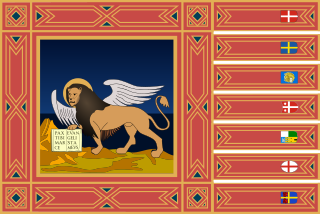
The Politics of Veneto, a Region of Italy takes place in a framework of a semi-presidential representative democracy, whereby the President is the head of government, and of a pluriform multi-party system. Executive power is exercised by the Regional Government. Legislative power is vested in both the government and the Regional Council.
Piedmontese Union was a regionalist political party active in Piedmont.
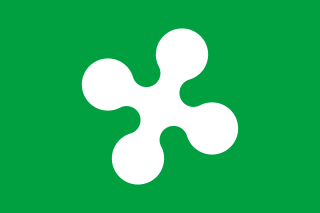
The Politics of Lombardy, Italy, takes place in a framework of a semi-presidential representative democracy, whereby the President of the Region is the head of government, and of a pluriform multi-party system. Legislative power is vested in the Regional Council of Lombardy, while executive power is exercised by the Regional Government led by the President, who is directly elected by the people. The current Statute, which regulates the functioning of the regional institutions, has been in force since 2008.

This page gathers the results of elections in Lombardy.

The Politics of Tuscany, Italy takes place in the framework of a semi-presidential representative democracy, whereby the President of the Region is the head of government, and of a pluriform multi-party system. Legislative power is vested in the Regional Council of Tuscany, while executive power is exercised by the Regional Government led by the President, who is directly elected by the people. The current Statute, which regulates the functioning of the regional institutions, has been in force since 2005.

The Politics of Umbria, one of the 20 regions of Italy, takes place in a framework of a semi-presidential representative democracy, whereby the president of the region is the head of government, and of a pluriform multi-party system. Legislative power is vested in the Legislative Assembly of Umbria, while executive power is exercised by the Regional Cabinet led by the President, who is directly elected by the people. The current statute, which regulates the functioning of regional institutions, has been in force since 2005.
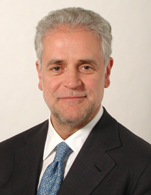
The Lombard regional election of 2005 took place on 3–4 April 2005. The 8th term of the Regional Council was chosen. Roberto Formigoni was re-elected for the third time in a row President, defeating Riccardo Sarfatti.

The Lombard regional election of 2000 took place on 16 April 2000. The 7th term of the Regional Council was chosen.

The Lombard regional election of 1995 took place on 23 April 1995. The 6th term of the Regional Council was chosen.
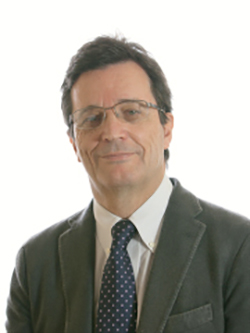
The Tuscan regional election of 2000 took place on 16 April 2000.
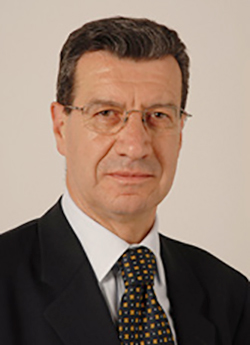
The Tuscan regional election of 1995 took place on 23 April 1995.

A large round of regional elections in Italy took place on 28–29 March in 13 regions out of 20, including nine of the ten largest ones: Lombardy, Campania, Veneto, Lazio, Piedmont, Emilia-Romagna, Apulia, Tuscany and Calabria.

The Lombard regional election of 2010 took place on 28–29 March 2010. The 9th term of the Regional Council was chosen.

The Italian regional elections of 1990 were held on May 16. The fifteen ordinary regions, created in 1970, elected their fifth assemblies.
Lega Autonomia Lombarda, also known as Lega per l'Autonomia Lombarda and whose extended name was Lega per l'Autonomia–Alleanza Lombarda–Lega Pensionati, was a left-wing regionalist political party in Italy, based in Lombardy.
Citizens of Milan elect every five years the Mayor of the city, presidents and members of 9 districts's assemblies and 48 members of the City Council, which controls Mayor's policy guidelines and is able to enforce his resignation by a motion of no confidence.

Lombardy elected its tenth delegation to the Italian Senate on June 14, 1987. This election was a part of national Italian general election of 1987 even if, according to the Italian Constitution, every senatorial challenge in each Region is a single and independent race.